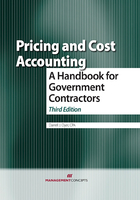
APPLICABILITY OF GOVERNMENT COST REGULATIONS
All contracts and contract modifications for supplies and services or experimental, developmental, and research work negotiated on the basis of cost with commercial organizations must adhere to the cost principles and procedures set forth in FAR Part 31.2. These cost principles must be used in pricing negotiated supplies, services, research contracts, and contract modifications with commercial organizations whenever the contract or subcontract exceeds $550,000. The cost principles and procedures must be used under the following circumstances:
1. Determining reimbursable costs under cost-reimbursement contracts, including any cost-reimbursement subcontracts, and the cost-reimbursement portion of T&M contracts
2. Negotiating overhead rates
3. Proposing, negotiating, or determining costs under firm-fixed price and cost-reimbursement contracts
4. Revising fixed-price-incentive contracts
5. Redetermining prices of prospective and retroactive price redetermination contracts
6. Pricing changes and other contract modifications.
Cost allowability provisions did not always apply to fixed-price contracts. By 1959, various versions of fixed-price contracts had become more common and the government designated the allowability provisions as “guides” to pricing fixed-price contracts. In July 1970, the regulations were revised to make cost allowability provisions applicable to both fixed-price contracts and cost-type contracts. This aspect was reinforced in a Board of Contract Appeals case involving the Lockheed-Georgia Co. (ASBCA No. 27660), where the Board accepted interest expense as an allowable cost despite the specific cost principle that states that interest expense for financing purposes is unallowable.
The cost allowability rules do not apply to U.S. government contracts awarded to the Canadian governmental agency known as the Canadian Commercial Corporation. This agency was established as a conduit for U.S. government contract awards to commercial organizations in Canada. By agreement between the two nations, such awards will be treated as exempt from cost rules because the awards are to the sovereign Canadian government, which has its own cost regulations.
FAR 31.102 states: “… application of cost principles to fixed-price contracts and subcontracts shall not be construed as a requirement to negotiate agreements on individual elements of cost in arriving at agreement on the total price. The final price accepted by the parties reflects agreement only on the total price. Further, notwithstanding the mandatory use of cost principles, the objective will continue to be to negotiate prices that are fair and reasonable, cost and other factors considered.”
The final price eventually agreed to by the parties reflects agreement only on the total price, not on line-item cost and profit amounts. This FAR provision anticipates disagreement in certain cases between the government and a contractor on the allow-ability and allocability of particular types of costs. Furthermore, this FAR provision recognizes that differences of opinion are certain to arise in interpreting the regulations, including the structure of cost allocation bases and indirect cost pools, as well as the allocation to cost objectives. The FAR focuses on the real objective of negotiating a bottom-line price for the work and not necessarily agreeing on each line item of cost and profit, such as labor, material, or overhead.
In this connection, the contractor may reach a bottom-line price quite differently from the way the government does. For example, the contractor might have a different concept of which cost items are allowable and allocable to the contract, such as certain items of labor and material, overhead, and G&A expenses. In addition, the contractor might believe that it was successful in negotiating 15 percent profit on the work, but the government might believe that it negotiated only a 7 percent profit. Again, the only amount on which there should be no difference of opinion is the bottom-line price incorporated into the contract.